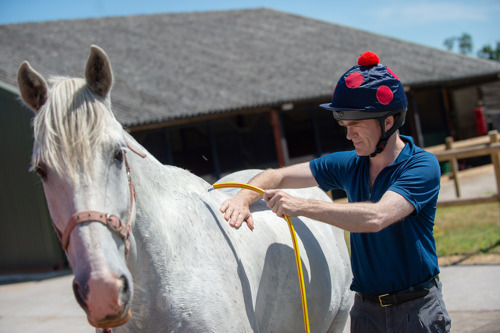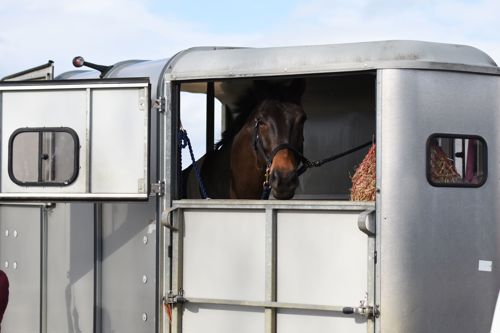How hot is ‘too hot’?
If your horse is sweaty, hot to touch, and breathing hard, they’re too hot. However, just like humans, some horses cope with heat better than others and the answer to this depends on the individual horse and various other factors.
Health and fitness
chevron-down
chevron-up
Be mindful of your horse’s individual health and fitness. For example, horses that are carrying excess weight, not fit or have an existing condition such as Cushing’s Disease, are likely to struggle in hotter weather.
What are horses used to?
chevron-down
chevron-up
What’s considered hot mostly depends on what the horse is used to. For example, if it’s been 30°C for a month and you’ve been riding your horse in the heat (around midday), they will likely cope with the temperature well1. But if it’s been cooler, e.g. 15°C, and the temperature suddenly rises to 25°C, your horse might find it more difficult.
If you enter a competition during hot weather and your time is during the hottest part of the day (midday – early afternoon) you may need to take precautions to help your horse. Remember, even if the temperature has been high for a few weeks, if you ride early in the morning or late in the evening, when it’s cooler, your horse won’t be fully used to the heat.
How humid, bright or windy is it?
chevron-down
chevron-up
When we ask how hot is too hot for horses, we usually think about air temperature, but heat stress involves other factors too, like humidity (the amount of moisture in the air) and sunlight2. Horses sweat to cool down, but high humidity slows this process. Sunlight also increases heat stress, especially on days with little to no cloud. Wind can help by speeding up sweat evaporation and cooling the horse.
How can I help my horse?
If you can’t avoid exercising your horse in the heat, there are several steps you can take to safeguard your horse’s safety and wellbeing.
Water
chevron-down
chevron-up
Make sure your horse has access to water, right up until the time you ride/drive and as soon as possible after exercise, including at a competition. This doesn’t increase the risk of colic and drinking should be encouraged – endurance horses, for example, will be offered water at various stops for the entirety of a competition.
If you’re concerned your horse isn’t drinking enough, see our advice on increasing your horse’s water intake.
Cooling down
chevron-down
chevron-up
The most effective way to cool your horse is by continuously pouring cold water over their body. By leaving the water to sit on your horse’s body and not scraping it off, it will evaporate and contribute to the cooling process3. If using a hose, make sure this is introduced to your horse gradually to start with, until they’re comfortable with the water. This can be harder to provide at competitions so as an alternative, you can continuously wash your horse down using a sponge and buckets of cold water.
When cooling a horse down after exercise, pay particular attention to the areas where the tack has sat. Be sure to wash off any dried sweat to avoid future irritation or discomfort.
Walking your horse helps remove the heat and lactic acid from their muscles, as well as assisting heart rate recovery and reducing muscle soreness.
Monitor vital signs and behaviours, before, during and after. Make sure recovery rates are normal and look out for signs of heat-related illness.

Photo Credit: Jon Stroud
Electrolytes
chevron-down
chevron-up
Electrolytes are salts and minerals that help with many different bodily functions such as urine production, digestion and muscle contraction. These can be lost in the horse’s sweat, breath, urine and droppings. A significant loss of electrolytes can cause dehydration, impaired performance and potentially lead to the development of azoturia (painful muscle cramps)4.
During competition and training, electrolyte losses can be considerable, particularly during hot weather.
Signs of electrolyte loss in horses include:
- Dull coat and eyes
- Lethargy/poor performance
- Dark urine
If your horse is in medium work or above, to help prevent the risk of dehydration and keep your horse at peak condition, it may be beneficial to feed electrolytes daily, rather than just during times of competition5. Make sure you follow the manufacturer’s recommendations on use and dose. If you add electrolytes to water, check that your horse doesn’t mind the taste as they may not drink anything at all, so it’s important to offer a bucket of plain water as well.
For those horses in light work, providing your horse with a salt lick may help replace vital nutrients that are easily lost through sweating. It’s important to be aware that horses can’t regulate their own electrolyte balance using a salt lick, so if their workload increases you may need to consider other ways to supplement their diet6.
Exercise and competing
Exercising in hotter temperatures is energy-consuming and if you’re riding in the heat it’s important to be aware that your horse’s ability to cope, even when acclimatised, will be less than in cool weather. You might need to:
- Ride slower or for shorter periods
- Give your horse regular breaks
- Access more shaded areas while hacking and don’t forget to wear hi-vis if you’re riding out as even in bright sunshine, patches of shade can make it difficult for drivers to spot horses on the road
- Exercise them early in the morning or late evening when the day is at its coolest unless you’re specifically trying to acclimatise your horse (for example due to your competition schedule) to hotter conditions, which can often take a minimum of two weeks of regular daily exercise
- Take extra precautions to thoroughly cool down your horse - if sufficient cooling isn’t carried out, it could compromise your horse’s health and wellbeing.
Competing
chevron-down
chevron-up
When competing in hot weather:
- Consider taking part in fewer classes than usual
- Make sure you check the availability of water at an event and take your own supplies
- Consider having another person to help cool your horse after exercise, especially if you’re away from home.
Warming up at competitions
- In hotter weather plan a shorter warm-up or split your warm-up into shorter sessions7.
- Following the warm-up, try to find a shaded area for your horse to rest or, if available, you can use water to cool down the horse. Lowering your horse's body temperature doesn't reverse the physical effects of the warm-up. Additionally, there shouldn’t be any restriction on participating in competitions with a wet horse that has been cooled down with water. This water will evaporate and cool the horse, reducing the need for them to sweat excessively7.

Photo Credit: Jon Stroud
Travelling
When travelling in hot weather:
- Aim to plan your journey so that it misses peak traffic to reduce the chance of getting caught up in any queues or congestion. Read The British Grooms Association’s advice on Horse & Hound about what action you can take if caught up in motorway traffic.
- Plan for the action needed should your vehicle breakdown. If possible, a portable fan may also be helpful for ventilation on a hot lorry as standing on a stationary vehicle for long periods can be detrimental to your horse’s health. See our best practice tips for breakdowns.
- Make sure you travel with a sufficient supply of water, particularly if your horse is a fussy drinker away from home. Monitor your horse and look out for any signs of dehydration.
- If you’re on a long journey, plan rest breaks every 2-3 hours8, provide water (if this isn’t already supplied) and remove any wet bedding or droppings if it’s safe to do so.
- Plan in extra time for your arrival to allow your horse to become accustomed to their surroundings, especially if they’re likely to be stressed or unsettled and make sure you provide plenty of water and forage.
- After a competition, don’t travel your horse home until you’re confident they’ve fully recovered. Be mindful that this may involve an overnight stay if you have concerns so plan ahead and book stables in advance, especially if you have a long journey.

Riding lessons in hot weather
During periods of hot weather, riding schools may continue to run lessons. However, be aware that your lesson content may be altered to reduce the risk of overheating for the horses. The duration, intensity and timing may change to reflect the weather conditions and welfare of the horses.
References
- Marlin, D., et al (2018). Preparation for and management of horses and athletes during equestrian events held in thermally challenging environments. In FEI Sports Forum.
- Dr David Marlin. (2024) How Are Decisions Around Climate Management For Major Equestrian Events Such As The Olympics Made?
- Takahashi, Y., et al. (2020). A Comparison of Five Cooling Methods in Hot and Humid Environments in Thoroughbred Horses. Journal of equine veterinary science, 91, 103-130.
- Lindinger, M. I. (2022). Oral electrolyte and water supplementation in horses. Veterinary sciences, 9(11), 626.
- Assenza, A., et al. (2014). Evaluation of Serum Electrolytes and Blood Lactate Concentration During Repeated Maximal Exercise in Horse. Journal of Equine Veterinary Science. 34(10) P 1175-1180.
- Haylie Kerstetter (2023) Effects of Electrolyte Supplementation on Horses in Hot Weather – The Horse
- Dr David Marlin. (2020) The Weather is Heating Up; Keep Your Horse's Temperature Down (useventing.com)
- The British Horse Society. Complete Horsemanship Volume 4. Kenilworth Press of Quiller Publishing Ltd. (2019). Pg. 199.
Get in touch - we're here to help
The BHS Horse Care and Welfare Team are available to offer you advice and support with any questions or concerns you may have.
Don’t hesitate to call us on 02476 840517* or email welfare@bhs.org.uk – You can also get in touch with us via our social media channels.
Opening times are 8:35am-5pm from Monday – Thursday and 8:35am-3pm on Friday.
*Calls may be recorded for monitoring purposes.


